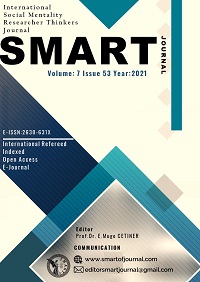Author :
Abstract
Realizmin ikinci dünya savaşından sonra idealizme alternatif bir kuram olarak popülaritesi artarken 1970’lerde ise değişen uluslararası dengeler realizmin eleştirilmesine yol açmıştır. Bu eleştiriler realizmin revizyona uğramasına ve neorealizmin ortaya çıkmasına yol açmıştır. Neorealist okul realist okulun bir alt dalı olarak devlet davranışlarından daha çok sistemi açıklamaya ağırlık vermektedir. Fakat aynı zamanda klasik realizmin uluslararası politikanın anarşik bir yapıya sahip olduğu, devletin en temel aktör olduğu, güvenliğin en önemli siyaset alanı olduğu ve gücün materyal kaynaklarının esas olduğu gibi temel varsayımlarını kabul etmektedir. Türkiye’nin Soğuk Savaş dönemi dış siyasetine baktığımızda da sistemsel iki kutuplu yapının dış siyasette iç dinamiklerden daha etkin olduğu genellemesini özellikle 1950’lere ilişkin olarak neorealist teoriden faydalanarak yapmak mümkün görünmektedir. Batı bloğu tercihi Türkiye’yi aynı zamanda Ortadoğu siyasetinde de Batı ile birlikte davranma noktasına getirmiştir. II. Dünya Savaşı’ndan sonra ortaya çıkan güç dengesi devletlerin davranışları üzerinde etkili olmuş, buna göre de Türkiye için Sovyetleri dengelemek ABD ile ittifak yapmak gibi bir sonuç doğurmuştur. Türkiye böylece ABD’nin çevreleme siyasetinin Ortadoğu’da önemli uygulayıcılarından biri haline gelerek Irak, İran gibi bazı bölge ülkeleri ile Pakistan ve İngiltere’nin katılımıyla Bağdat Paktı’nın üyesi olmuştur. Bu çalışma, Türkiye’nin Bağdat Paktı üyeliğini neorealizmin temel varsayımları bağlamında ele almaktadır.
Keywords
Abstract
While the popularism of realism increased as an alternative theory for idealism after the Second World War, the change in the international balances resulted in the criticism of realism in the 1970s. These criticisms caused the revision of realism and the emergence of neorealism. The neorealist school as a sub-branch of the realist school focuses on explaining the system rather than government's behaviors. However, it also accepts the basic assumptions of classical realism that international policy has an anarchic structure, the government is the only actor, security is the most important political sphere, and material sources of power are the fundamentals. When we look at Turkey's foreign policy during the Cold War, it seems possible to generalize under the neorealist theory, especially regarding the 1950s, that systemic bipolar structure was more efficient than internal dynamics. The choice of the western bloc brought Turkey to the point of acting together with the West in Middle East policy, as well. The power balance that emerged after the Second World War had an impact on the governments' behaviors; accordingly, Turkey's balancing the Soviets resulted in an alliance with the USA. Turkey became a member of the Baghdad Pact with certain countries in the region such as Iraq and Iran with the attendance of Pakistan and England, thus becoming an important implementer of the USA's containment policy in the Middle East. This study deals with Turkey's membership in the Baghdad Pact within the context of the basic assumptions of neorealism.
Keywords
- Arı, T. (2002). Uluslararası İlişkiler Teorileri: Güç, Hegemonya, İşbirliği, İstanbul: Alfa Yayınları.
- Arı, T. (2002). Uluslararası İlişkiler Teorileri: Güç, Hegemonya, İşbirliği, İstanbul: Alfa Yayınları. Arıboğan, D. Ü. (1997). Globalleşme Senaryosunun Aktörleri, Der Yayınları, İstanbul.
- Bağcı, H. (2014). Türk Dış Politikasında 1950’li Yıllar, Der Yayınları, Ankara.
- Bostanoğlu, B. (1999). Türkiye-ABD İlişkilerinin Politikası, İmge Yayınları, Ankara.
- Bull, H. (1972). “The Theory Of International Politics 1919-1969” In B. Porter (ed). The Aberystwyth Papers: International Politics 1919-1969. Oxford: Oxford University Press, pp. 30-55.
- Çalış, Ş. H. (2006). “Uluslararası Örgütler: Tanımların, Yaklaşımların Ve Tarihin Alacakaranlığı”,Uluslararası Örgütler Ve Türkiye, Editör: Şaban H. Çalış, Birol Akgün, Önder Kutlu, Konya: Çizgi Kitabevi, s.1-33.
- Dağı, İ.D. (2001). “Normatif Yaklaşımlar: Adalet, Eşitlik Ve İnsan Hakları”, Devlet Sistem Ve Kimlik: Uluslararası İlişkilerde Temel Yaklaşımlar, Der: Atila Eralp, İletişim Yayınları, İstanbul, s.185-226.
- Eralp, A. (2001). “Uluslar Arası İlişkiler Disiplininin Oluşumu: İdealizm Realizm Tartışması”, DevletSistem Ve Kimlik: Uluslararası İlişkilerde Temel Yaklaşımlar, Der: Atila Eralp, İletişim Yayınları, İstanbul, s.57-88.
- Eroğul, C. (2013). Demokrat Parti Tarihi ve İdeolojisi, İstanbul: Yordam Kitap.
- Hobbes, T. (1996). “Leviathan”, Çev: Asena Günalp, Uluslararası İlişkiler Ve Siyaset Teorisi Üzerine Bir Derleme, Der: Howard Williams vd. Siyasal Kitabevi, Ankara.
- Hobden, S. (1998). International Relations & Historical Sociology: Breaking Down Boundaries, Florence, KY, USA: Routledge.
- Keyman, E. F. (2000). Küreselleşme, Devlet, Kimlik/Farklılık: Uluslararası İlişkiler Kuramını Yeniden Düşünmek, Çev: Simten Çoşar, Alfa Yayınları, İstanbul.
- Kösebalaban, (2014). Türk Dış Politikası, (Çev. Hüsamettin İnanç), BinBang Yayınları.
- Little, R. (1997). “International Relations And The Triumph Of Capitalism”, International Relations Theory Today, Edited By: Ken Booth And Steve Smith, Cambridge: Politiy Pres, pp.62-88.
- Machaivelli N. (1996). “Prens”, Çev: Zana Çitak, Uluslararası İlişkiler Ve Siyaset Teorisi Üzerine Bir Derleme, Der: Howard Williams Vd. Siyasal Kitabevi, Ankara.
- Morgenthau, H. J. ; Thompson, K. W. And Clinton, W.D. (1985). Politics among nations: The struggle for power and peace.
- Mütercimler, E. ve Öke, M. K. (2004). Düşler ve Entrikalar: Demokrat Parti Dönemi Türk Dış Politikası, Alfa Kitap, İstanbul.
- Pamukçu, K. (1998). “Küresel Isınma Örneğinde Uluslararası Ekolojik Yaklaşım-Uluslararası PolitikadaYeni Bir Bakış”, Uluslararası Politikada Yeni Alanlar Yeni Bakışlar, Der: Faruk Sönmezoğlu, Der Yayınları, İstanbul, s.426-448.
- Sander, O. (2016). Türk-Amerikan İlişkileri 1947-1964, İmge, Ankara.
- Sönmezoğlu, F. (2002). Uluslararası İlişkilere Giriş, Der Yayınları, İstanbul.
- Tanrısever O. F. (2001). “Yöntem Sorunu: Gelenekselcilik-Davranışsalcılık Tartışması”, Devlet Sistem VeKimlik: Uluslararası İlişkilerde Temel Yaklaşımlar, Der: Atila Eralp, İletişim Yayınları, İstanbul, s.89-129. Türkmen, F. (2012). Türkiye ABD İlişkileri, Timaş Yayınları, İstanbul 2012.
- Umar, Ö. O. (2013). Bağdat Paktı, Ankara.
- Uslu, N. (2016). Çatlak İttifak: 1947’den Günümüze Türk-Amerikan İlişkileri, Nobel.
- Yaılvaç, F. (2001). “Uluslararası İlişkiler Kuramında Yapısalcı Yaklaşımlar”, Devlet Sistem Ve Kimlik: Uluslararası İlişkilerde Temel Yaklaşımlar, Der: Atila Eralp, İletişim Yayınları, İstanbul, s.149-156.
- Yurdusev, A.N. (2001). “Uluslararası İlişkiler” Öncesi”, Devlet Sistem Ve Kimlik: Uluslararası İlişkilerde Temel Yaklaşımlar, Der: Atila Eralp, İletişim Yayınları, İstanbul, s.15-55.
- Waltz, K. (1982). “Uluslararası İlişkiler Kuramı”, Uluslararası İlişkiler Kuramı Ve Dünya Siyasal Sitemi İçinde, Çev. Ve Der: Ersin Onulduran, Ankara Üniversitesi Siyasal Bilgiler Fakültesi Yayınları, s.3-95.
- Waltz, K. N. (1990). “Realist Thought And Neorealist Theory”, Journal of International Affairs, 44 (1), pp.31-37
- Weber, C. (2005). International Relations Theory,: A Critical Introduction, New York: Routledge.
- Wendt, A. (1999). Social Theory Of International Politics, Cambridge: Campridge University Pres.





